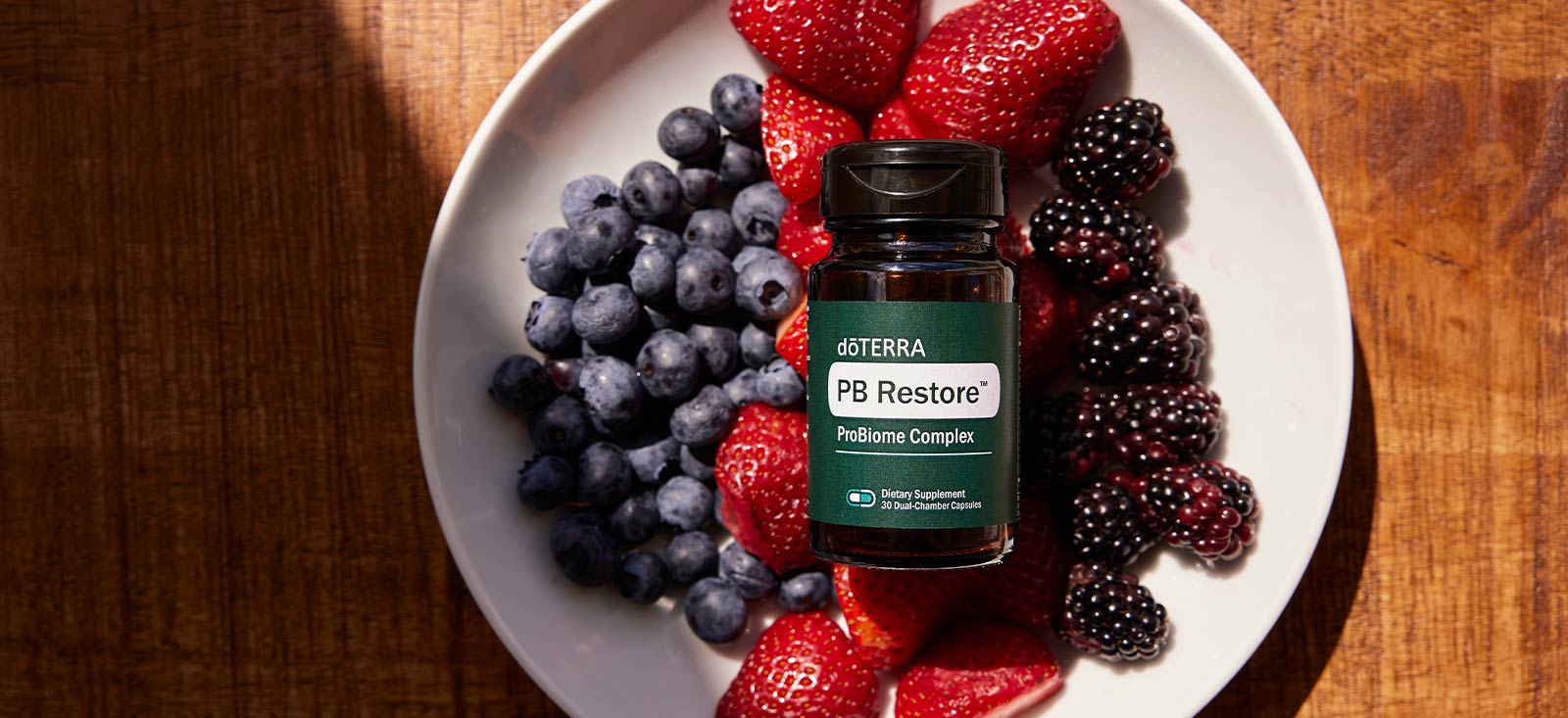Origin: a Latin derivative
meaning "Gift of the Earth."
- Shop
-
Our Story
- View Our Story Home
- Who We Are. . . .
- What We Do. . . .
- Why We Do It. . . .
-
dōTERRA[doh-teh-ruh]
Big Changes Start with Micro Steps


In today’s world, words like bacteria or virus have negative connotations, making you want to sanitize every hour and steer clear of touching something when you don’t know where it’s been.
But not all bacteria and viruses are bad; in fact, many are essential for your health. When you support a healthy microbiome, your body becomes much better at determining which ones are good and bad. Your body contains more bacterial and fungal cells than human cells. That’s right. You’re more microbe than human!
To visualize this, imagine planting a garden. A vibrant garden is a beautiful place with a variety of plants, flowers, and insects. Your microbiome is similar to a garden, where the bacteria, viruses, and fungi are like different plants and insects. Just like a healthy garden needs a good balance of plants and insects to thrive, your body needs a diverse and balanced microbiome to stay healthy.
Bring Diversity “Bac”
When you promote and encourage diversity within your microbiome it helps your microbiome do what it’s supposed to do—keep you feeling healthy and resilient. Your microbiome will be able to separate the good bacteria from the bad so that your body acts resilient at handling stressors and adapting quickly to changing circumstances.
This research has been the inspiration behind the doTERRA PB Restore+™ ProBiome supplements.
doTERRA PB Restore+
doTERRA PB Restore is designed with your whole-body biome in mind. In one little dual chamber capsule, we deliver a proprietary blend of 30 bioactive components of pre-, pro, and postbiotics and bacteriophages. These represent the four P’s in one ProBiome complex, and it’s a four-fold increase in the number of strains, compared to our previous capsule! And these strains have been meticulously selected for doTERRA PB Restore.
Let's go over each of those strains:
Primary Probiotic Strains and Health Benefits*
Synbio L. rhamnosus IMC501 + L. paracasei IMC502
- Increases healthy bacteria counts, while inhibiting the impact of unwanted bacteria.
- Improves the body’s recovery processes and tiredness sensation after training by lowering exercise-induced oxidative stress.4
- Supports gastrointestinal functions and promotes a healthy immune response.
- Maintains healthy and stable vaginal environment by increasing Lactobacillus abundance at the vaginal level.
- Lowers reactive oxygen metabolites after exertion, which gets harder to do with age.4
- Maintain healthy immune function and strength and efficiency of gastrointestinal tract when responding to stressful conditions.
B. animalis ssp. lactis BLC 1
- Promotes lactose digestion to suppress occasional bloating or digestive discomfort.1
- Maintains healthy bowel habits and digestive health and helps manage occasional constipation.1
L. acidophilus LA1
- Offers general digestive health support.
- Stimulates natural immune system by inhibiting unwanted bacteria.
- Can improve lipid metabolism, benefiting overall health.
- Produces enzymes that are associated with supporting cardiovascular health.
L. rhamnosus SP1
- Maintains the health of teeth and maintenance of oral mucosa, which acts as a barrier to harmful microbes, when regularly taken.3
- Promotes skin health and visual improvement in occasional blemishes or dryness.
- Supports maintaining of oral health as we age.3
L. brevis SP48
- Supports mood, sleep, and brain function by naturally increasing GABA levels—a principal neurotransmitter of the central nervous system.1
L. rhamnosus LB21
- Maintains oral health and supports healthy teeth throughout life.3
L. reuteri LR92
- May help reduce occurrence of digestive discomfort in infants as part of maternal prenatal supplementation during the last four weeks of pregnancy.
Contributing Probiotic Strains and Health Benefits*
B. breve BBr8
- Helps sustain a healthy microbiota for improved digestive health.
- Boosts the health of the immune system.1
- May contribute to healthy weight.1
Lactococcus lactis ssp. lactis SP38
- Supports gut immune function, fortifying healthy bacteria colonization, while inhibiting the spread of unwanted bacteria.1
B. bifidum SP9
- Helps stimulate immune response and digestive health in infants.
L. casei BGP 93
- Improves regular bowel movements and helps manage occasional constipation.
Enteroccocus faecium
- Has antimicrobial properties that support gut immune function and inhibit the spread of unwanted gut flora.
L. fermentum LF2
- Can improve lipid metabolism, benefiting overall health.3
- Improves long-term quality of life and wellness health.3
- Supports gut immune function by releasing specific healthy microbial molecules.3
L. helveticus SP27
- Improves systemic health by improving bioavailability of food components and modulating microbiota composition and beneficial metabolites.
- Activates immune responses, healthy vascular elasticity, flow and circulation.
L. paracasei BGP2
- Positively impacts intestinal and immune pathways for biological health benefits.1
- Can improve lipid metabolism, benefiting overall health.1
- Enhances gut health.1
L. plantarum 14D
- Helps sustain a healthy microbiota for improved digestive health.
- Sustains bifidobacteria — a beneficial bacteria that declines with age.1
S. thermophilus SP4
- Supports the maintenance of healthy microbiota balance and improves lactose digestion.
L. crispatus SP28
- Maintains predominance of lactobacilli and a healthy vaginal ecosystem.
L. delbrueckii ssp. bulgaricus LB2
- Aids in lactose digestion.1
- Helps sustain a healthy microbiota for improved digestive health.1
B. longum ssp. infantis SP375
- Aids in the proper development and strengthening of immune functions in infants.
B. longum ssp. longum SP542
- Supports the intestinal barrier to help inhibit unwanted microbes from growing.
L. gasseri SP33
- Maintains predominance of lactobacilli and a healthy vaginal ecosystem.
L. salivarius SP2
- Supports gut immune function, inhibiting the spread of harmful microbes.1
1 Based on preclinical research. More clinical research is needed.
2 Based on multi-strain research. More research on this strain alone is needed.
3 Based on research involving different delivery systems. More research involving capsules is needed.
4 Based on research of young athletes. More research on other age groups is needed.
5 Based on meta-analysis.
There’s one postbiotic strain in doTERRA PB Restore: L. rhamnosus CRL 1505 HI. It functions like a ghost probiotic. It’s an after-life, nonliving probiotic that’s still recognized by your epithelial and immune cells. Comparative studies about this strain have demonstrated this heat-inactivated immunobiotic provides a cell wall and peptidoglycan, supporting the innate immune response related to respiratory health.*
There are four bacteriophages in doTERRA PB Restore: LH01-Myoviridae, LL5-Siphoviridae, T4D-Myoviridae, and LL12-Myroviridae.
These ’phages seek out unwanted microbes that can compromise digestive health, urinary tract health, and other systems of the body. They effectively clear space for probiotics to do their important work. They destabilize the cell walls of the unwanted bacteria and take over important functions to subdue their impact.*
While a good probiotic can help to maintain microbiome balance and strengthen the immune system, the innovative addition of bacteriophages to our doTERRA PB Restore ProBiome Complex means the 24 probiotics strains may have an amplified impact and ability to improve your intestinal health.*
*These statements have not been evaluated by the Food and Drug Administration. This product is not intended to diagnose, treat, cure, or prevent any disease.
-
Copied to clipboard
- Download


